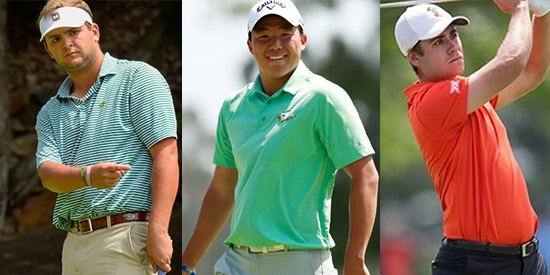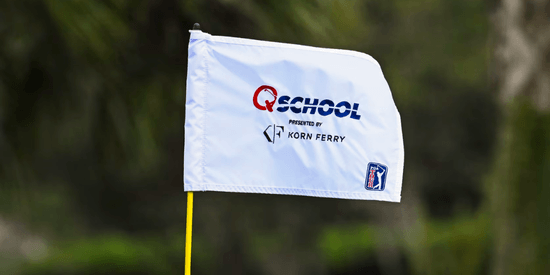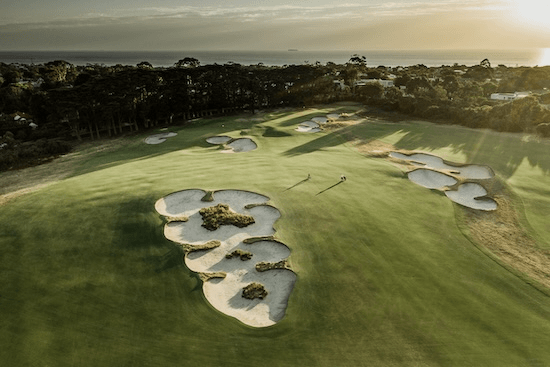U.S. Amateur: Three Tied at the Top After Round One
8/14/2017 | by United States Golf Association
see also: View results for US Amateur, Merion Golf Club - East Course

Norman Xiong, Hayden Wood, and Mark Lawrence, Jr. are all six under as only 27 of 312 players break par
Norman Xiong of San Diego, CA and Hayden Wood of Edmond, OK both returned six-under 64s at the harder Riviera Country Club, while Mark Lawrence, Jr. of Richmond, VA had his 64 at Bel-Air.
RELATED:
U.S. Am Notes: Interview with Canadian Mid-Am Garrett Rank
U.S. Am Notebook: Day One of Qualifying at Riviera
U.S. Am Notebook: The ball doesn't know Zahringer's age
Range Notes: 61s and Burgers at the U.S. Amateur
Tee Times for Stroke Play Qualifying
TV Times and Schedule of Play
VIDEO: Players to Watch at the U.S. Amateur
117th U.S. Amateur: A Closer Look at the Field
U.S. Amateur Qualifying Roundup
The morning layer of low clouds – very typical for coastal California – that hung over Riviera and Bel-Air lifted by 10 a.m. on Monday, ushering in sunshine that was as bright as the scoring during the first round of stroke play in the 117th U.S. Amateur Championship. The world’s finest amateurs, 312 in all, were split over the two courses on Monday. Here are some observations to help tell the stories of the day.
Featured Group
The strongest field in amateur golf boasts plenty of star power, but one group was a cut above the rest. Norman Xiong, Doug Ghim and Cameron Champ were a collective 9 under par in their rounds at Riviera. Xiong led the way with a 6-under 64, Ghim carded a 67 and Champ came in with a 70. Each player entered the week having captured a significant title in the past month: Xiong won the Western Amateur on Aug. 5, Ghim won the Pacific Coast Amateur on July 21 and Champ won the Trans-Miss Amateur on July 13. As the field jockeys for position, these players have to like where they stand.
First Off the Tee
On the first tee at Riviera Monday morning, P.J. Samiere, of Kailua, Hawaii, had the honor of striking the first ball at 7 a.m. Perhaps it was a case of nerves or just a poor swing, but the 21-year-old pulled his drive out of bounds into the area where the Fox Sports compound is located this week. He ended up making a triple-bogey 7 on the 509-yard par 4. To his credit, he battled back from the early misstep to play 1 under par the rest of the way, carding a hard-fought, 2-over 72.
The 117th #USAmateur gets underway. https://t.co/nLhWtBgfuk
— USGA (@USGA) August 14, 2017
The Game for a Lifetime
There aren’t many sports where competitors of multiple generations compete on a level playing field. In this year’s U.S. Amateur, the average age of the 312-player field is 22.39, and the oldest player, 64-year-old George Zahringer, of New York, N.Y., is grouped with 19-year-old Logan Lowe, of Grass Valley, Calif., and 21-year-old Raul Pereda of Mexico, for the first two rounds. While the young bucks managed to outplay their more senior counterpart on Monday at Riviera (69 for Lowe, 70 for Pereda and 75 for Zahringer), we’re not discounting the 2002 U.S. Mid-Amateur champion’s chances just yet. The group tees off at 12:36 p.m. on Tuesday at Bel-Air Country Club, a course that is nearly 500 yards shorter than Riviera, and Zahringer will draw on his vast experience to keep his match-play hopes alive.
Scott Gregory has been disappointed recently in the first rounds of major events. Gregory, of England, was the winner of the 2016 Amateur Championship, conducted by The R&A, and that victory earned him entry into the 2016 Open Championship, as well as this year’s Masters and the U.S. Open. Gregory opened with a 78 at Royal Troon last summer, and missed the cut after a 73 in Round 2. He began his Augusta foray in April with an 82 before settling down to shoot a 75, still missing the cut. At Erin Hills in June, he opened with a 75 and again improved, with a 73, but missed the cut again.
On Monday at Bel-Air, Gregory had another rocky start to a championship he would dearly love to win, playing his opening nine holes, the incoming nine, in 3 over par. But Gregory didn’t wait for the second round to rebound, notching three birdies coming in, including one on his final hole, to post an even-par 70. That score left him inside the top 45 of the 312-player field as the day wound down, with a good chance to make the match-play draw.
Before the championship, Gregory, 22, said, “I can’t think of anything I want more than the U.S. Am. That means I’d have them both [the U.S. Amateur and the Amateur Championship titles]. How many people have done that?”
Bel-Air’s Tight, Testing Finish
After playing practice rounds on Riviera and Bel-Air, 2014 U.S. Mid-Amateur champion Scott Harvey declared the incoming side at Bel-Air the toughest test of the four nines, even though it is by far the shortest at 3,362 yards.
The course statistics are bearing out his prediction. The par-34 nine winds through narrow canyons on the side of the Santa Monica Mountains, and length means little. The nine is playing to a scoring average of 37.28, more than three strokes over par, while the next-toughest side – the front at Riviera – is more than 200 yards longer and playing 2.76 strokes over its par of 34. The toughest of the holes for the day at Bel-Air is the 230-yard, par-3 13th, on which the field is averaging 3.61 strokes, with only five birdies, 73 bogeys to just 66 pars, nine double bogeys and three “others.”
Results: US Amateur
| Place | Player | Location | Pts | Scores |
|---|---|---|---|---|
| Win | Raleigh, NC | 2000 | ||
| Runner-up | Arlington Heights, IL | 1500 | ||
| Semifinals | Greenwich, CT | 1000 | ||
| Semifinals | Richmond, VA | 1000 | ||
| Quarterfinals | , Scotland | 700 |
About the US Amateur
The U.S. Amateur, the oldest USGA championship, was first played in 1895 at Newport Golf Club in Rhode Island. The event, which has no age restriction, is open to those with a Handicap Index of .4 (point four) or lower. It is one of 15 national champ...
Most Popular Articles

2025 PGA TOUR Q-School Guide: Sites, Scores, and Who Advanced
Dec 5, 2025Second Stage is complete and Final Stage awaits at Sawgrass — follow every Q-School leaderboard and the players still chasing
2025 LPGA TOUR Q-Series: Final Qualifying Stage FINAL SCORING
Dec 8, 2025Helen Briem earns medalist honors, 31 players headed to the LPGA next year
Australian Open at Royal Melbourne: Preview, amateur bios, and how to watch
Nov 30, 2025Rory McIlroy headlines one of the championship's top fields in years - at least four amateurs will have their chance at glory
Luke Ringkamp Cruises to Rolex Tournament of Champions Title at TPC San Antonio
Nov 26, 2025One week after committing to Pepperdine, Luke Ringkamp won the Rolex Tournament of Champions by nine shots.Inside Gil Hanse’s Restoration of Baltusrol’s Upper Course: A Return to Tillinghast’s
Dec 11, 2025Renowned architect Gil Hanse reveals how he brought Baltusrol’s Upper Course back to life by honoring A.W. Tillinghast’s original